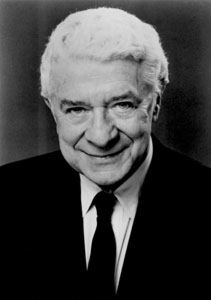David Susskind
| David Susskind | |
|---|---|

David Susskind circa 1980
|
|
| Born |
David Howard Susskind December 19, 1920 New York City, New York, U.S. |
| Died | February 22, 1987 (aged 66) New York City, New York, U.S. |
| Nationality | American |
| Alma mater | Harvard University (B.A.) |
| Known for | Television host, personality, producer |
| Spouse(s) |
|
| Relatives | Dorothy (sister) Murray (brother) |
David Howard Susskind (December 19, 1920 – February 22, 1987) was an American producer of TV, movies, and stage plays and also a pioneer TV talk show host. His talk shows were innovative in the genre and addressed timely, controversial topics beyond the scope of others of the day. He drew controversy for his scathing opinion of Muhammad Ali's resistance to the military draft.
Susskind was born in Manhattan, and grew up in Brookline, Massachusetts. He attended the University of Wisconsin–Madison and then Harvard University, graduating with honors in 1942. He served during World War II and, as communications officer on an attack transport, USS Mellette, saw action at Iwo Jima and Okinawa.
His first job after the war was as a press agent for Warner Brothers. Next he was a talent agent for Century Artists, ultimately ending up in the powerhouse Music Corporation of America's newly minted television programming department, managing Dinah Shore, Jerry Lewis, and others. In New York, Susskind formed Talent Associates, representing creators of material rather than performers. Ultimately, Susskind produced movies, stage plays and television programs.
In 1954, Susskind became producer of the NBC legal drama Justice, based on case files of the Legal Aid Society of New York. His program, Open End, began in 1958 on New York City's commercial independent station WNTA-TV, channel 13, the predecessor to WNET, and was appropriately titled: the program continued until Susskind or his guests were too tired to continue.
In 1961, Open End was constrained to two hours and went into national syndication. The show was retitled The David Susskind Show for its telecast on Sunday night, October 2, 1966. In the 1960s it was the first nationally broadcast television talk show to feature people speaking out against American involvement in the Vietnam War. In the 1970s it was the first nationally broadcast television talk show to feature people speaking out for gay rights. The show continued until its New York outlet cancelled it in 1986, approximately six months before Susskind died.
...
Wikipedia
